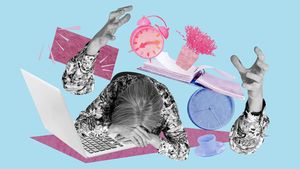A new report from the National LGBTQ+ Women’s Community Survey was recently published, highlighting things like sexuality and gender identity, political affiliations, income, education, and the struggles that LGBTQ+ women are experiencing in the U.S.
The organization surveyed 5,002 LGBTQ+ women across the county between June 2021 and June 2022 and asked over 100 questions to try and get a snapshot of what is happening in the lives of queer women.
Lesbians made up 2,798 or 56% of respondents, with another 791 people identifying as queer and 742 calling themselves bisexual. More than 52% selected “femme” as their gender identity, with “butch” and “nonbinary” both making up less than half that number. The survey is full of fascinating and valuable information, including that more LGBTQ+ women report having a mental health disability (32%) compared to adults in the U.S. (24%) and that 1 in 4 respondents reported being BIPOC. From having better sex to facing greater levels of discrimination, the study lays bare the beautiful and brutal parts of being a lesbian.
So, in honor of Lesbian Visibility Week, let’s dig into the data and look at the most interesting things the survey found about LGBTQ+ women!
Friends forever

Shutterstock
LGBTQ+ women face a tremendous amount of abuse, but the study shows that they rely on friends to help them weather the storm. The survey found that 65% of respondents reported experiencing verbal harassment, 51% reported being bullied, 32% reported facing sexual harassment, 16% had been sexually physically assaulted, and 13% had been sexually assaulted. Those surveyed reported being a woman, being LGBQ+, and being nonbinary or trans were the main reasons they were abused. In contrast, 45% of BIPOC respondents reported race/ethnicity as the driver of abuse.
But the data seems to prove what lesbians have known for decades, that found family and community are how queer women get through tough situations like these.
A whopping 50% of those surveyed said that their top resource for surviving abuse at school was their friends, and 57% reported relying on friends to survive an abusive partner. Having a community of people to support you becomes even more important when you take into account that 54% of people surveyed said that the police were "not helpful at all" when dealing with intimate partner violence.
Education doesn't equal higher salary

Shutterstock
The survey found that LGBTQ+ women are more educated than the rest of the population, with 52% working full-time with a graduate or professional degree, compared with only 14% of all full-time workers. Despite being more likely to have a college degree than your average worker, LGBTQ+ women make significantly less money. Those making under $100,000 made up 45.1% of respondents, with 20.2% making under $50,000, while only 22.6% made over $100,000.
Gender-fluid, pansexual, and trans-identified people have it the worst, experiencing more economic uncertainty than their peers whose gender was unchanging throughout their lives. BIPOC women also reported higher levels of poverty and gender fluidity, which seems to confirm how multilayered discrimination can be.
Political policy

Shutterstock
Of the LGBTQ+ women surveyed, 31.8% said that health care and reproductive rights are their top policy priority, with economic justice, protecting the environment, dealing with climate change, racial justice, and LGBTQ+ equality close behind.
The survey also found that 9 out of 10 respondents voted in the 2020 election, with 96% voting Democrat. But the survey also cautioned that Millenial and Gen Z LGBTQ+ women are "increasingly disaffected with mainstream political parties and movements."
Discrimination and violence

When asked about the main drivers behind the discrimination and violence LGBTQ+ women face, those surveyed reported that sexism (38%), racism (34%), anti-LGBTQ+ hate (26%), and body weight (18%) were the leading causes.
Lesbian sex is just better!

Shutterstock
LGBTQ+ women are having sex more often (84%) than the general population (73%). The survey found that 73% reported having consensual sex in their "authentic gender or sexuality often or sometimes. Nearly 1 in 2 respondents reported that "their sexual life gives them a great deal (24%) or a lot (21%) of joy and pleasure."
Duh, we could have told you that! The survey's results also fall in line with a recent report published in the journal Social Psychological and Personality Science, which found that lesbians reported more clitoral stimulation and more orgasms during intercourse than straight women, The Advocate reports.































































































